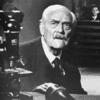- Sjöström, Victor
-
or Victor Seastromborn Sept. 20, 1879, Silbodal, Swed.died Jan. 3, 1960, StockholmSwedish film actor and director.Trained as a stage actor, he directed and starred in his first movie, The Gardener, in 1912. With notable films such as Ingeborg Holm (1913), The Outlaw and His Wife (1918), and The Phantom Carriage (1921), he established the artistic excellence of the Swedish silent film in the post-World War I era. In 1923 he moved to Hollywood, where he directed movies such as The Scarlet Letter (1926) and The Wind (1928). He returned to Sweden in 1930 and acted in numerous films, notably Ingmar Bergman's Wild Strawberries (1957). Sjöström's films are lyrically beautiful expressions of humanity's relationship to nature and to society.
 Sjöström in Wild Strawberries, 1957By courtesy of the Museum of Modern Art/Film Stills Archive, New York City
Sjöström in Wild Strawberries, 1957By courtesy of the Museum of Modern Art/Film Stills Archive, New York City* * *
▪ Swedish directorSjöström also spelled Seastromborn Sept. 20, 1879, Silbodal, Swed.died Jan. 3, 1960, Stockholmmotion-picture actor and director who contributed significantly to the international preeminence of the Swedish silent film in the post-World War I era. Influenced by the novels of Selma Lagerlöf, whose art is rooted in sagas and folklore and imbued with a reverence for nature, Sjöström's films were lyrically beautiful expressions of man's relationship to nature and to society.Trained as a stage actor, Sjöström directed and starred in his first film, Trädgårdsmästaren (The Gardener), in 1912. Other notable films were Ingeborg Holm (1913); Terje vigen (1916; Third Way), an experiment in the integration of setting and theme; and Berg ejvind och hans hustru (1917; The Outlaw and His Wife), in which he refined the technique of light diffusion and the use of significant details. With the release of Körkarlen (The Phantom Carriage, or The Soul Shall Bear Witness) in 1920, the artistic excellence of the Swedish film was recognized throughout the world.Emigrating to Hollywood in 1923, Sjöström directed pictures in which he further refined his visual techniques—e.g., He Who Gets Slapped (1924), The Scarlet Letter (1926), The Divine Woman (1927), and The Wind (1928). Their pictorial beauty and realism were reminiscent of his finest Swedish films. Although his American films were critically acclaimed, they were not outstanding box-office successes. In 1930 Sjöström returned to Sweden. Though he directed a few more films, it was primarily as an actor that he participated in the post-World War II Swedish film revival. One of his outstanding performances was that of the aged hero of Ingmar Bergman's film Smultronstället (1957; Wild Strawberries).* * *
Universalium. 2010.
